Brian Clegg's Blog, page 104
January 8, 2014
The night of the hamster
 The picture in question (I'm bottom right)For my recent appearance on the University Challenge Christmas Special I was asked to provide a picture of myself while at Lancaster University, which has caused some amusement to those who saw the show (they seem surprised by the hair). What wasn't obvious is that this was actually a group photograph of those of us who shared a kitchen in Bowland College, pictured after a birthday celebration.
The picture in question (I'm bottom right)For my recent appearance on the University Challenge Christmas Special I was asked to provide a picture of myself while at Lancaster University, which has caused some amusement to those who saw the show (they seem surprised by the hair). What wasn't obvious is that this was actually a group photograph of those of us who shared a kitchen in Bowland College, pictured after a birthday celebration.Looking at it brought back remarkable memories of an excellent year - but also of one of the spookiest moments of my life.
I was in bed, determined to finish a book I was reading that night. (Not because it was a great book, but because I just wanted to get it over with. It might have been Inferno by Niven and Pournelle, but it might not.) It was about 3 am. (What can I say? I was a student. Students do crazy things.) As I read, out of the corner of my eye I caught a movement in my room.
I sat up abruptly. The only illumination was a dim reading light over my head. But I could see nothing out of place. Two pages later, I glimpsed it again. Something white, moving rapidly across the floor. A small, white ball. Could it be a ball lightning? It had gone again. I looked back at the book, but kept a side-view onto the floor. And then it appeared in all its glory. A fluffy white hamster. I had no idea how it got into my room, but I had no intention of letting it stay.
Bearing in mind that it was 3am, it seemed reasonable to try to catch it by putting a carrier bag on the floor with a piece of cheese in it. Remarkably, this also seemed reasonable to the hamster, who casually entered the bag and I scooped it up. So far, so good. But I knew no one with a hamster.
So I went into the kitchen portrayed above, clutching my carrier bag. By now it was about 3.15 am, but there were a couple of people around. (We were students, crazy things, etc. etc.) Remarkably someone knew that my next door neighbour but one, who I didn't know as he used another kitchen, had a hamster. I knocked on his door and reacquainted him with his pet. While not ecstatic at being woken up, he seemed quite pleased to get it back.
Back to my room. I shut my door behind me, grabbed my book, slid into bed, looked down... and there on the floor was the hamster. Again. I checked that door. There was no more than a half inch clearance, while the hamster looked four times that height, but somehow it had followed me back.
This time it let me pick it up by hand. Finally the hamster was returned and placed firmly in its cage. I was worn out. There was no hope of finishing the book. But there was one more memory attached to Bowland College and that (rather tatty) kitchen.
Published on January 08, 2014 00:26
January 7, 2014
Spin dizzy
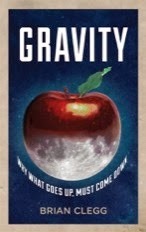 I had an interesting tweet the other day from a reader of my book Gravity. Richard Atkinson said: 'reading your gravity book. P3 "the whole thing is rotating" why? If uni started from a single point what made it spin?' It's a thought provoking question.
I had an interesting tweet the other day from a reader of my book Gravity. Richard Atkinson said: 'reading your gravity book. P3 "the whole thing is rotating" why? If uni started from a single point what made it spin?' It's a thought provoking question.I ought to start by clarifying the quote. The 'whole thing' I was referring to was the cloud of dust and gas from which the solar system formed, not the whole universe. Whether the universe as a whole is spinning is a whole different question, where the mind struggles to get around the concept of 'spinning with respect to what' given that there may be nothing else. It is possible it does spin (see this article) but we certainly don't know for sure.
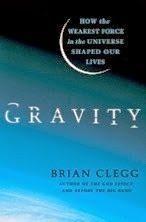 But let's get back to the actual quote, about the solar system. What made that spin? Pretty well everything within the universe spins. Overall the angular momentum of the galaxies seem to pretty much cancel out, but for any particular galaxy, as it forms, the slight rotation produced by linear motion combined with gravitational attraction inwards gets magnified as the galaxy condenses (the old 'skater spins faster as (s)he draws her/his arms in' effect). In principle, if all the bits that coalesced to form a galaxy started off still and symmetrical, a galaxy (or solar system) could form without spinning, but in practice there is always movement and asymmetry to start with and the result is to produce a rotation, which then increases with time.
But let's get back to the actual quote, about the solar system. What made that spin? Pretty well everything within the universe spins. Overall the angular momentum of the galaxies seem to pretty much cancel out, but for any particular galaxy, as it forms, the slight rotation produced by linear motion combined with gravitational attraction inwards gets magnified as the galaxy condenses (the old 'skater spins faster as (s)he draws her/his arms in' effect). In principle, if all the bits that coalesced to form a galaxy started off still and symmetrical, a galaxy (or solar system) could form without spinning, but in practice there is always movement and asymmetry to start with and the result is to produce a rotation, which then increases with time.Similarly as the solar system forms, the cloud of gas and dust picks up an increasing spin, which produces the flattened disc shape of both galaxies and solar systems. Yet again, planets spin increasingly quickly as they condense under gravity. The real oddity here is Venus, which rotates in the opposite way to expectation. There is a theory that this could be due to a massive collision, but there is no good evidence for this (other than the spin), so at the moment it is arguably an intriguing mystery.
If you fancy a little mental challenge yourself, you can take a look at Gravity on Amazon.co.uk and Amazon.com.
Published on January 07, 2014 01:38
January 6, 2014
Evolving statistics
One of the great puzzles for British people is that Americans seem quite like us, mostly because of a shared language and to some degree a shared culture, yet at the same time there are aspects that raise our eyebrows - and never more so than over the attitude to evolution.
Thanks to US legal writer Donna Ballman for pointing out a fascinating survey on public views on human evolution in the US. I just wanted to pull out a few of the figures.
The headline number that is decidedly worrying in what is, after all, the world's leading nation for science and technology is that 33% of adults believe that 'humans existed in present form since beginning' - i.e. they have not evolved over time. But what was really interesting was the way these beliefs varied significantly when put alongside a few other measures.
There is, perhaps not surprisingly, a strong correlation between religious views and attitude to evolution. Unfortunately we aren't told anything except about Christians or 'unaffiliated' - there is nothing about other faiths. But the variation within Christian sects is stark. Where 78% of 'white mainline protestants' are behind evolution (well above the national average), only 27% of 'white evangelical protestants' think evolution had a role in our development. That's pretty shocking. Perhaps less surprisingly, there is also a correlation with education - the more educated the person, the more likely to believe in evolution.
But perhaps the most distressing breakdown is the difference between Republicans and Democrats. Where 67% of Democrats believe we evolved, only 43% of Republicans do. As always with statistics, we have to be careful about confusing causality with correlation. The chances are that it is not the case that being a Republican makes you less like to support evolution, but rather you are more likely to be a Republican if you have certain religious beliefs (for instance). But the reason I label this distressing is that in just 4 years there has been a significant shift in the split. Back in 2009, those percentages were 64% Democrats to 54% Republicans, only a few percentage points off being statistically insignificant. The split is getting stronger and that can't be good.
Interestingly, the Democrat/Republican split is almost exactly the same as the 18-29 versus 65+ split, where 68% of the youngsters are pro-evolution, but only 49% of the oldsters.
It's not my place to tell US political parties what to think, but surely the Republicans powers-that-be should be worried about the statistic that less than half of their voters think human beings evolved - and that this percentage is dropping. It doesn't bode well for the future of US science under Republican administrations.
Thanks to US legal writer Donna Ballman for pointing out a fascinating survey on public views on human evolution in the US. I just wanted to pull out a few of the figures.
The headline number that is decidedly worrying in what is, after all, the world's leading nation for science and technology is that 33% of adults believe that 'humans existed in present form since beginning' - i.e. they have not evolved over time. But what was really interesting was the way these beliefs varied significantly when put alongside a few other measures.
There is, perhaps not surprisingly, a strong correlation between religious views and attitude to evolution. Unfortunately we aren't told anything except about Christians or 'unaffiliated' - there is nothing about other faiths. But the variation within Christian sects is stark. Where 78% of 'white mainline protestants' are behind evolution (well above the national average), only 27% of 'white evangelical protestants' think evolution had a role in our development. That's pretty shocking. Perhaps less surprisingly, there is also a correlation with education - the more educated the person, the more likely to believe in evolution.
But perhaps the most distressing breakdown is the difference between Republicans and Democrats. Where 67% of Democrats believe we evolved, only 43% of Republicans do. As always with statistics, we have to be careful about confusing causality with correlation. The chances are that it is not the case that being a Republican makes you less like to support evolution, but rather you are more likely to be a Republican if you have certain religious beliefs (for instance). But the reason I label this distressing is that in just 4 years there has been a significant shift in the split. Back in 2009, those percentages were 64% Democrats to 54% Republicans, only a few percentage points off being statistically insignificant. The split is getting stronger and that can't be good.
Interestingly, the Democrat/Republican split is almost exactly the same as the 18-29 versus 65+ split, where 68% of the youngsters are pro-evolution, but only 49% of the oldsters.
It's not my place to tell US political parties what to think, but surely the Republicans powers-that-be should be worried about the statistic that less than half of their voters think human beings evolved - and that this percentage is dropping. It doesn't bode well for the future of US science under Republican administrations.
Published on January 06, 2014 00:21
January 3, 2014
A quite interesting year
 The 'quite interesting' year I refer to is not a look back at 2013, but a glimpse of the summer of 1927 given to us by Bill Bryson in his latest book. In fact a glimpse is a bit of an understatement as a description of this doorstep of a tome.
The 'quite interesting' year I refer to is not a look back at 2013, but a glimpse of the summer of 1927 given to us by Bill Bryson in his latest book. In fact a glimpse is a bit of an understatement as a description of this doorstep of a tome.As the cover suggest, one of the major themes of the book is the rise to outstanding fame of Charles Lindbergh as a result of his aerial Atlantic crossing. As Bryson surprisingly informs us, this was not actually the first crossing by air but around the 120th. It had certainly been done by plane earlier by Alcock and Brown. But somehow Lindy's flight caught the imagination of the world and he became a superstar.
The rise and fall of Lindbergh occupy a fair amount of the book, but we also meet his competitors and other notables of the period in America from politics to sport (notably baseball and boxing) and bringing in everything from famous murders of the period (through to the details of their electrocution) to the sad disaster that was prohibition and the gangsters who profited from it.
Overall, Bryson's skill is in weaving all this together into an enjoyable tapestry. If I'm honest I much prefer his travel books, where the personal story and humour makes the writing a lot more fun, and I had to skip over the sports sections which I found deadly dull, but despite being about an obscure year in a foreign country it still made for a very readable book that kept the pages turning.
For me, one of the greatest delights of the read was finding out more about Texas Guinan, who features in one of my favourite numbers from the Yale Song Book, George Jones.
You can find out more about One Summer at Amazon.com and Amazon.co.uk
Published on January 03, 2014 02:17
January 2, 2014
Prime time
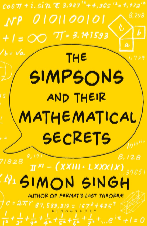 I am indebted to Simon Singh's excellent new book The Simpsons and their Mathematical Secrets, which I recently reviewed, for providing me with what must be the longest trivially memorable prime number at a whopping 31 digits.
I am indebted to Simon Singh's excellent new book The Simpsons and their Mathematical Secrets, which I recently reviewed, for providing me with what must be the longest trivially memorable prime number at a whopping 31 digits.Prime numbers are much loved by mathematicians. Of itself this is no great achievement - mathematicians are routinely besotted with numbers that only their parents could love - but primes are genuinely interesting. (For a start, the RSA mechanism that keeps your banking details safe when you buy online depends on them.) You will probably remember from school that primes are the whole positive numbers that are only divisible by themselves and 1 - so they begin 2, 3, 5, 7, 11, 13, 17...
You may wonder why 1 is not a prime and you would not be alone. In fact it was until a couple of hundred years ago, when mathematicians decided it was too unique (they probably missed the pun) and excluded it. Mathematicians can do this (unlike physicists), as they make up their own rules.
The number revealed in the book is Belphegor's prime, named after one of the princes of Hell, though I think it would be much better called the devilish prime. One thing that helps make it memorable is that it is a palindrome - it reads the same forwards as backwards - but the main (dare I say, the prime) reason it springs to mind so easily is its devilish construction.
Start with the number of the beast, 666 and stick a horribly unlucky 13 zeroes either side. Finally cap it off with bookends of 1 and you get
1000000000000066600000000000001
... a 31 digit prime number that is entrancingly memorable. Thanks, Simon!
Published on January 02, 2014 02:31
December 31, 2013
Educational good news
 Approaching the town hallThis is a time of year that is associated with good news, so it is great to be able to bring some good educational news when we are always hearing bad things about schools, universities and Michael Gove. Just over a week ago, though it seems a lot longer thanks to Christmas, I was at Rochdale Sixth Form College's awards ceremony.
Approaching the town hallThis is a time of year that is associated with good news, so it is great to be able to bring some good educational news when we are always hearing bad things about schools, universities and Michael Gove. Just over a week ago, though it seems a lot longer thanks to Christmas, I was at Rochdale Sixth Form College's awards ceremony.Located in the imposing Victorian gothic grand hall of the Town Hall, the event was a celebration of the year's leavers' achievements, the majority now at university, and it turned out to be one of my favourite events of the year. My role was to give a motivational speech and to hand out around 200 certificates, accompanied with the obligatory smile and photo - which sounds like a very repetitious task, but saying hello to all the different students made it surprisingly enjoyable.
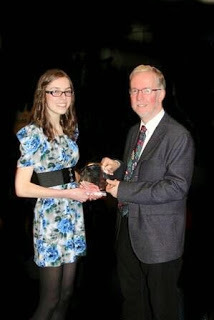 With RSFC student of the year
With RSFC student of the yearRhiann CanavanThe reason I say it was good educational news was down to the remarkable achievements that the staff and students have made. Four years ago, RSFC was just a construction site, located in a borough that was one of the worst in the country for sixth form achievement. But in its short life, RSFC has become one of the few sixth form colleges to get an outstanding Ofsted and is rated one of the top colleges in the country.
There are times when it is difficult to be proud to come from Rochdale - but this was definitely one where my home town deserves a few accolades.
Here's to a great 2014 for all of us, but especially for Rochdale Sixth Form College and its leavers, who I had the pleasure to meet a few days ago.
Read more about the college in this article from the Independent.
Published on December 31, 2013 01:45
December 30, 2013
It doesn't need saving
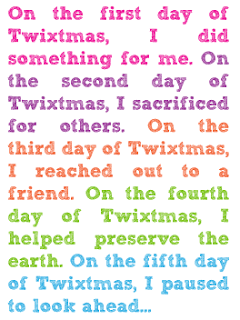 The graphic that made me grumpyWhen I made the remark online 'I sometimes feel that the period between Christmas and New Year is what being retired would be like, but with more tinsel', someone kindly pointed me to the Twixtmas website. The website itself is excellent, promoting the idea of doing something worthwhile with those days - but there was graphic on it that made me slightly grumpy (rare though I know this is).
The graphic that made me grumpyWhen I made the remark online 'I sometimes feel that the period between Christmas and New Year is what being retired would be like, but with more tinsel', someone kindly pointed me to the Twixtmas website. The website itself is excellent, promoting the idea of doing something worthwhile with those days - but there was graphic on it that made me slightly grumpy (rare though I know this is).I've said it before and I will say it again, because it needs repeating. We do not need to do anything to preserve the earth. It is utterly pointless trying to 'save the earth.' I don't say this because I am full of doom and gloom, but because given a few million years (a teeny snippet of time in the Earth's lifetime) our planet can shrug off any environmental messing up we can manage. The earth does not need saving, we do.
Unlike the earth, we need very narrowly fixed environmental conditions to survive comfortably - conditions, incidentally that have been decidedly uncommon in the earth's history and probably will be in the future unless we intervene appropriately. All the 'saving the planet' guff, should really be about saving humanity. And because it is the earth's nature not to spend a huge amount of time in the goldilocks zone where we are comfortable, the chances are that saving humanity is going to involve interfering with nature on a large scale, which is decidedly scary.
I am not saying we shouldn't try to minimise future climate change, because we should. We probably did need some global warming to avoid going back into an ice age (we are currently in an interglacial), but we've had more than enough to do that, and now we need to stop quickly to avoid going too far the other way. But it's certainly not as simple as being green and returning to nature.
So there we have it. Do something great with the period between Christmas and the New Year (I can't bring myself to call it Twixtmas), but don't attempt to preserve the earth. It will just end in tears.
This has been a Green Heretic production
Published on December 30, 2013 01:41
December 25, 2013
Simply
Published on December 25, 2013 01:09
December 19, 2013
Diamonds are so last century
 Most simple inorganic compounds - think sodium chloride, for instance - are amongst the more familiar substances. But boron nitride, just boron and nitrogen is something most of us have never heard of. Which is amazing when you consider how remarkable it is. Because its electronic structure is similar to carbon it can take all the forms that carbon does, from an equivalent of the wonder material graphene to a diamond substitute - and often it does the job better than the original.
Most simple inorganic compounds - think sodium chloride, for instance - are amongst the more familiar substances. But boron nitride, just boron and nitrogen is something most of us have never heard of. Which is amazing when you consider how remarkable it is. Because its electronic structure is similar to carbon it can take all the forms that carbon does, from an equivalent of the wonder material graphene to a diamond substitute - and often it does the job better than the original.So prepare to get all abrasive as you hurry over to the RSC compounds site to see more on this useful inorganic compound. If you'd like to listen straight away, just click here.
Published on December 19, 2013 01:04
December 18, 2013
Universally Challenged
 Earlier this year I was surprised and delighted to be the answer to a question on University Challenge, the venerable and much-loved quiz show, so I was even more filled with jollity to be asked to appear on the Lancaster team for the Christmas edition of the show, which features graduates with a little more experience of life, the universe and everything, rather than the usual youths. The format otherwise, though, is the same, down to the sizzling quizmastership of Jeremy 'Take No Prisoners' Paxman.
Earlier this year I was surprised and delighted to be the answer to a question on University Challenge, the venerable and much-loved quiz show, so I was even more filled with jollity to be asked to appear on the Lancaster team for the Christmas edition of the show, which features graduates with a little more experience of life, the universe and everything, rather than the usual youths. The format otherwise, though, is the same, down to the sizzling quizmastership of Jeremy 'Take No Prisoners' Paxman.The result of the invitation was a trip to the ITV studios in the glossy new MediaCity development that has transformed the old Salford Docks into something rather glamorous. Across the water, Coronation Street actors smoulder on their new set, while in the main development BBC and ITV come together in a friendly merge that is somehow well reflected in the way ITV makes University Challenge for its old rivals.
MediaCity is worth an exploration in its own right - and we were staying in the Holiday Inn that is right in the middle of the complex - but inevitably the highlight was the filming of the show itself. I was one of the less experienced of the contestants when it came to TV, but even old hands were a little nervous at taking part in such an institution. In total there were 14 teams taking part, of which 4 would go through to the semi-finals, representing a handful of Oxbridge colleges and some of the more modern institutions.
I can't deny I was nervous, but when it came down to it, it was great fun. Our team genuinely enjoyed it in the good old British sense of 'it's the taking part that counts', so win our lose, we were in it for the enjoyment. This helped hugely by the make up of the team - brilliant people one and all. Apart from me, Lancaster was represented by the Daybreak news presenter Ranvir Singh, the film actor (also about to be in Games of Thrones) Roger Ashton-Griffiths and the food critic and TV food judge Matthew Fort. I can say nothing about the result - but we had a truly brilliant experience (probably best of all socialising over a meal afterwards).
If you want to see Christmas University Challenge in action it starts tonight, Friday 20 December, on BBC2 at 7.30pm. Our match against the University of Kent is on tomorrow night, 7.05pm, again on BBC2.
 Photo (c) ITV Studios, reproduced with permission
Photo (c) ITV Studios, reproduced with permission
Published on December 18, 2013 06:34




